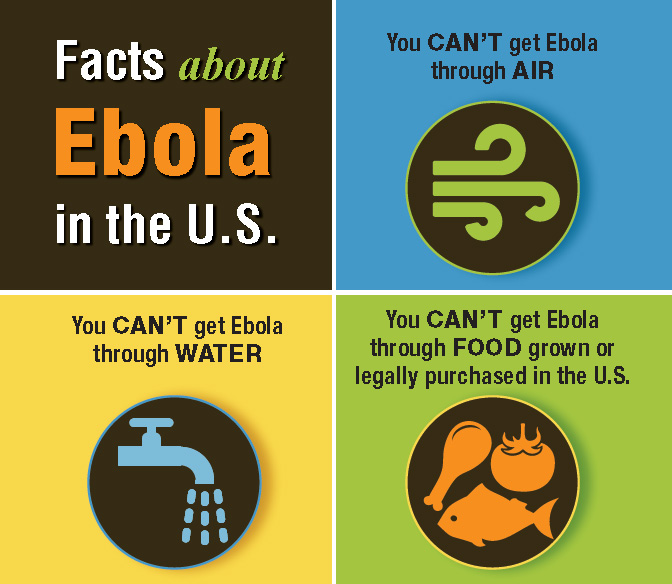 Ebola Facts and Resources
Ebola Facts and Resources
While a large Ebola outbreak continues in West Africa, the risk of an outbreak in the United States is very small. There are currently NO confirmed cases of Ebola in Montgomery County or in the Washington area. A nurse who cared for an Ebola patient in Dallas, Texas was treated at the National Institutes of Health (NIH) in Bethesda, which is specially equipped to handle such cases. She was discharged from NIH on October 24, 2014.
If there is a confirmed case of Ebola infection in a Montgomery County resident, the County’s Department of Health and Human Services and local hospitals will work together to respond and limit spread of the disease.
This page contains the most current information for health care facilities and the general public.
Key information about how Ebola spreads:
- Ebola is NOT spread through the air or by water or by food.
- A person infected with Ebola virus in NOT contagious until symptoms appear.
- The virus is spread through direct contact (through broken skin or unprotected mucous membranes in, for example, the eyes, nose or mouth) with the blood or bodily fluids (such as urine, feces, saliva, semen) of a person who is sick with Ebola, or with objects like needles that have been contaminated with the virus, or infected animals.
For the general public:
- Current and Complete Ebola Information and Resources (CDC)
- General Fact Sheet (Maryland Department of Health and Mental Hygiene)
- Information about the 2014 West African Ebola Outbreak (CDC)
- Is It Flu or Ebola? (CDC)
- What You Need To Know About Ebloa (CDC Fact Sheet)
For parents:
For health care workers and facilities:
- Maryland Department of Health and Mental Hygiene Guidance
- Guidelines for Evaluation in Outpatient Settings (MD Dept. of Health and Mental Hygiene)
- Comprehensive Information for Health Care Workers and Facilities (CDC)
- Algorithm for Evaluation of Returned Travelers
- Checklist for Patients being Evaluated for Ebola Virus Disease
- Fact Sheet: Healthcare Workers--Could It Be Ebola?
- Guidelines for Clinicians in Health Care Settings
- Health Care Facility Preparedness Checklist
- Health Care Provider Preparedness Checklist
- Detailed Hospital Checklist for Ebola Preparedness
- Guidance for Environmental Infection Control in Hospitals for Ebola Virus Disease
- CDC Health Advisory: Evaluating Patients for Possible Ebola Virus Disease
For EMS and public safety personnel:
For oral health professionals (dental):
Updated: 10/28/14